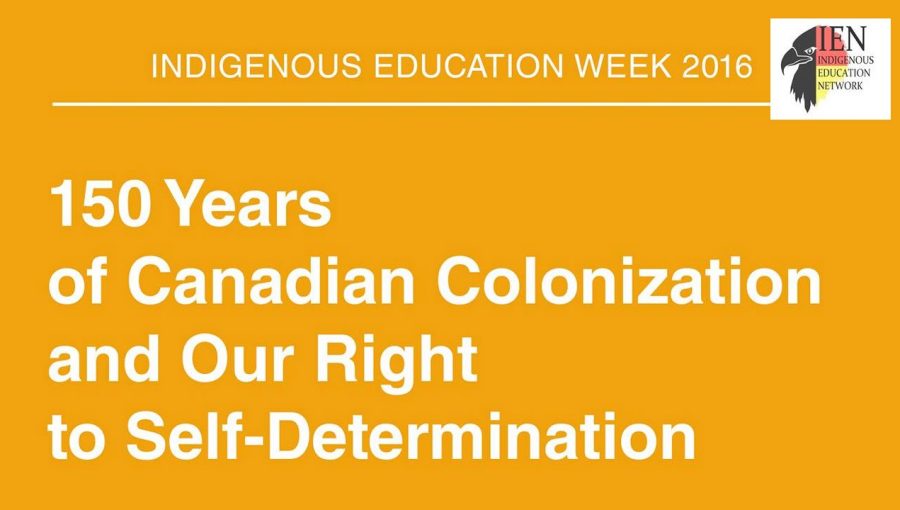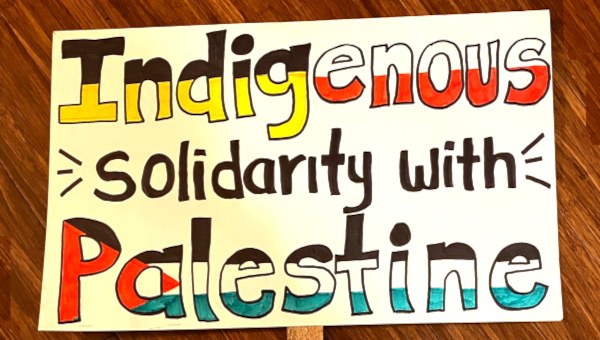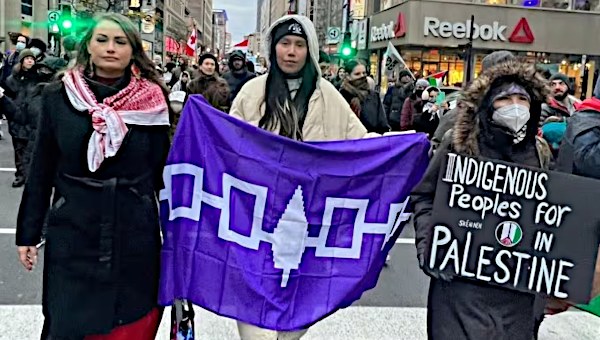“He who controls the past controls the future. He who controls the present controls the past.”
— 1984 by George Orwell
Canada’s colonial past is present, however much Prime Minister Stephen Harper seeks to obfuscate the reality of the history of this land. This week has served as a prime example of how denial of past colonialism helps to perpetuate ongoing colonial relationships. The current flashpoint is the small town of Rexton, New Brunswick, where the Elsipogtog First Nation and their supporters are facing down massive RCMP repression of their protests against activity by SWN Resources, a company that is carrying out seismic testing for proposed oil and gas fracking operations in the area. On October 17, hundreds of RCMP officers, including snipers and many heavily armed officers, moved in against Elsipogtog land defenders who have
maintained a protest camp and presence in the area for months. Dozens were arrested, and there were reports of rubber bullets fired by police forces. Several RCMP vehicles were set ablaze.
 Fracking may have been the latest spark, but Harper’s government has been fanning the flames for years – denying the true colonial history of Canada even while continuing to actively undermine the sovereignty and rights of First Nations. On Wednesday this week, the Conservative government presented their much-hyped Speech from the Throne, in which they asserted the founders of Canada:
Fracking may have been the latest spark, but Harper’s government has been fanning the flames for years – denying the true colonial history of Canada even while continuing to actively undermine the sovereignty and rights of First Nations. On Wednesday this week, the Conservative government presented their much-hyped Speech from the Throne, in which they asserted the founders of Canada:
“dared to seize the moment that history offered. Pioneers, then, few in number, reached across a vast continent” and “forged an independent country where none would have otherwise existed.”
This was no one off rhetorical flourish. This was just the latest expression of “Harper’s History.” In 2009, Harper, with a straight face, informed a press conference at a G20 summit that Canada “had no history of colonialism.”
Colonialism Denial
These seem like astounding and easily disproven assertions, but colonialism denial is real and useful because it serves colonialism present; it serves the primary purpose of the Conservative government today, which is to push through resource extraction projects – many of which are in direct contradiction with Indigenous peoples – at all costs.
The repression at Rexton and Harper’s latest bald-faced lie about Canadian history come in the same week that James Anaya, the UN’s Special Rapporteur on Indigenous Rights, issued a scathing report after a nine-day visit across the country. Anaya concluded that “Canada faces a crisis when it comes to the situation of indigenous peoples of the country.”
Rexton, New Brunswick – Elsipogtog – now takes its place in a long and shameful history, joining Oka, Ipperwash, Gustafsen Lake and so many more. At Ipperwash, unarmed protester Dudley George was murdered by the OPP. At
Gustafsen, 14 Sun Dancers asserting Indigenous sovereignty were met with 400 RCMP officers, troops, armoured personnel carriers and 70,000 rounds of ammunition. And this is just recent history.
“Contrary to the myth of seamless and peaceful nation-building, the modern Canadian state was built through the projection of force over and against Indigenous peoples.”
Contrary to the myth of seamless and peaceful nation-building, the modern Canadian state was built through the projection of force over and against Indigenous peoples. The RCMP, and before it the Northwest Mounted Police, was formed with this express purpose. This is the colonial reality behind all assertions of the “rule of law,” past and present. It’s all about whose laws get enforced. Indigenous law? International law? Not in Harper’s Canada today, where the law of corporate profit rules. Only we can change that, and solidarity actions with the courageous land defenders of Elsipogtog are the first order of business.
Susan Levi-Peters, a former chief, makes it clear that they remain determined in the face of RCMP sniper rifles, rubber bullets and tear gas: “Nobody is leaving … We don’t want shale gas here. We have been asking for consultations for three years now and nothing has happened. Instead they just put our people in jail.”
IdleNoMore has already shown us that creative, determined actions can reach across a vast continent, creating powerful movements where none would otherwise have existed. So let us seize the moment that history is offering. Let us stand with Elsipogtog.
Find your local solidarity action at www.wearepowershift.ca. •
This article first appeared on the Georgia Straight website.
Federal Police and New Brunswick Government
Assault First Nations Anti-Fracking Protest
Roger Annis
On October 17 the RCMP launched a violent assault on a blockade protest against shale gas fracking company on the outskirts of the New Brunswick village of Rexton, just north of Moncton. The protest action has been led by the Mi’kmaw people of the Elsipogtog First Nation. A symbolic protest that was slowing traffic on a nearby highway has been in place since September 30 to halt the fracking activities of Houston-based SWN Resources.
The fracking company obtained an injunction to halt the protest and the RCMP moved in to enforce it yesterday. They attacked the protesters with guns drawn, using pepper spray and dogs while camouflaged police snipers had rifles pointed and at the ready. Forty people were arrested, including Elsipogtog Chief Arren Sock. When Chief Sock was arrested, RCMP vehicles were set on fire and trees were cut to block the nearby highway adjoining the scene.

Former Elsipogtog chief Susan Levi-Peters told the Globe and Mail, “It’s Oka all over again,” referring to the historic, months-long, armed standoff between the Mohawk people and the Canadian and Quebec governments in 1990 at Oka, Quebec, just outside of Montreal.
Chief Sock and some of the other people arrested were released from jail yesterday. Solidarity actions are taking place across Canada and in the United States today. The Real News Network is showing video footage of the clash.
News: Grand Chief Stewart Philip of Union of BC Indian Chiefs condemns police assault in New Brunswick, from the Vancouver Observer, Oct 18, 2013.
The situation has calmed overnight and presently there are only small numbers of protesters and police on site.
The Mi’kmaw say the fracking is taking place on traditional hunting lands and is a violation of their sovereign rights. Their concerns are shared by many other residents in the region and across the province. All are deeply concerned about the pollution of fresh water and land that fracking will cause.
New Brunswick is governed by a Conservative Party government elected in 2010. It supports gas fracking but the issue is highly contested. In 2011, the Union of New Brunswick Municipalities voted by just 22-18 against a resolution in favour of a province-wide moratorium. Mayors in the eastern New Brunswick region where the RCMP assault took place voted 16-1 in July of this year to ask the government to impose a fracking moratorium in their region. (See more background on fracking in New Brunswick here.)
There were arrests this summer at the protest site near Rexton. Twenty five of 35 charges have been dropped so far, according to CBC News.
The Mi’kmaw are the Indigneous people of the lands now known as the Canadian provinces of New Brunswick, Nova Scotia and Prince Edward Island. The late Donald Marshall Jr. was the most well-known modern Mi’kmaw by virtue of his victory against a police frame-up that saw him serve 11 years in prison in the 1970s and 1980s for a murder he did not commit. He later won a court victory establishing historic fishing rights that had been taken from his people.
Pamela Palmateer has written an excellent background article on this story that appears in today’s Rabble.ca. She writes,
“Yesterday morning, we awoke to reports from the Mi’kmaw of swarms of RCMP dispatched to Elsipogtog to enforce Harper’s aggressive natural resource agenda. He has effectively declared war on the Mi’kmaw.”
“It is more than coincidental timing – it was obviously strategically calculated with the completion of the Governor General’s speech from the throne and the end of the United Nations Special Rapporteur James Anaya’s visit to Canada.”
Her commentary details the long history of police and government assault against the rights of the Mi’kmaw people. •
Roger Annis resides in Vancouver and can be reached at rogerannis@hotmail.com. This article first published in the Vancouver Observer, and also published on his blog www.rogerannis.com.





